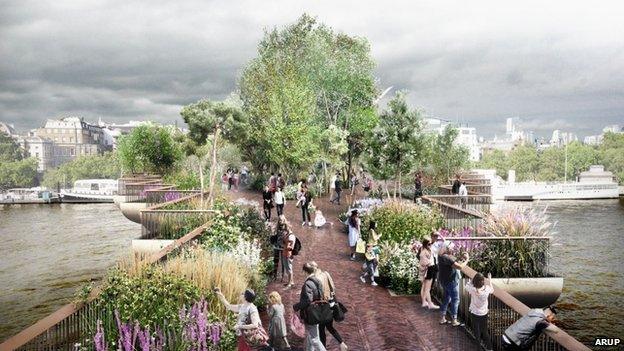David Cameron 'ignored civil servants over Garden Bridge funding'
- Published

The tree-covered Garden Bridge would span the Thames between Temple and the South Bank
David Cameron personally intervened to approve extra taxpayer funding for London's controversial Garden Bridge project, it has emerged.
The former prime minister did so against advice from officials, an investigation by the National Audit Office (NAO) found.
The NAO said nearly £23m of taxpayer money was now at risk of being lost.
Transport Minister Lord Ahmad said the government remained supportive of the project.
London mayor Sadiq Khan has ordered a full review of the proposals for the Thames river crossing.
'Formal direction'
The Whitehall spending watchdog said government ministers ignored the advice of civil servants on at least two occasions not to extend funding to the Garden Bridge Trust.
On the second occasion that they did so Conservative party chairman Sir Patrick McLoughlin, who was then transport secretary, issued a formal ministerial direction to civil servants requiring them to extend the taxpayers' exposure and underwrite liabilities of £15m if the project did not go ahead.
That ministerial direction was issued after cabinet secretary Sir Jeremy Heywood wrote to the Department for Transport (DfT) expressing the "frustration" of Mr Cameron and then chancellor George Osborne at perceived hold-ups to the funding.
The NAO said the initial commitment to provide £30m of taxpayers' money was made by Mr Osborne to Mr Khan's predecessor, Boris Johnson, without any involvement of the DfT.
Under the agreement in autumn 2013 the mayor would contribute a further £30m while the remainder - then estimated at £115m - was to come from private funding.


Plans propose more than 270 trees and 2,000 shrubs would be planted on the bridge
Garden Bridge funding so far:
£30m from Transport for London, £20m has been pledged as a loan to be repaid in full
£30m from central government
About £37m has been spent so far
If the project is finished, then not only will the £20m be repaid to TfL, but the Garden Bridge Trust will need to pay about £22m in VAT to the Treasury - leaving an ultimate cost to the taxpayer of £18m

The DfT agreed to make that investment, despite an assessment of the business case finding there was a "significant risk" that the bridge could represent "poor value for money".
It did so by increasing its block grant to Transport for London (TfL).
The DfT also sought to protect taxpayers' money by capping the amount which could be spent by the trust before construction began at £8.2m.
But on three separate occasions - between June 2015 and May 2016 - this was relaxed by the DfT.
"Officials from the department advised ministers against increasing the department's exposure for the second and third increases," the NAO said.
The watchdog said there was now "significant risk" the project would not go ahead, pointing out the Garden Bridge Trust had still not secured the land for its southern landing.
The mayor has promised no more public money would be provided for the bridge's construction and tasked the former chair of the Public Accounts Committee (PAC) of MPs, Dame Margaret Hodge, with analysing the proposals to ensure taxpayers' money was not being wasted.

Dame Margaret Hodge is leading a review into whether value for money has been achieved for the taxpayers' £60m contribution to the bridge
Meg Hillier MP, the current chair of the PAC, said: "It worries me that whenever the Garden Bridge Trust runs into financial trouble, the Department for Transport releases more taxpayers' money before construction has even started.
"If the project collapses, taxpayers stand to lose £22.5 million. If it goes ahead, who is going to pick up the bill to maintain it?"
The Garden Bridge Trust said it had raised nearly £70m of private money and was working on finalising the land deals required to build the south landing.
Repayable loan
It pointed out that 78% of the project cost would be raised from private finance.
While £60m of taxpayers' money was being invested initially, this was being treated as money to kick start the project, with £20m being treated as a repayable loan and roughly the same amount to be repaid to the Treasury in VAT, leaving the taxpayer with a net contribution of £20m if construction of the bridge did go ahead.
Transport Minister Lord Ahmad said ministers had taken into account many factors before deciding whether to make funding available.
He added: "The taxpayer, however, must not be exposed to any further risks and it is now for the trust to find private-sector backers to invest in the delivery of this project. We will consider the NAO's findings carefully."
- Published22 September 2016

- Published26 July 2016
